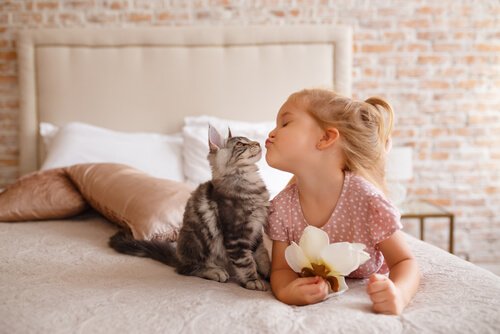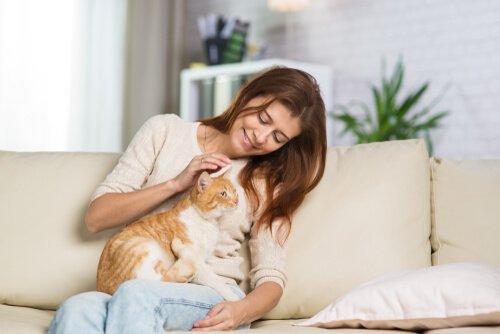Socializing Cats: Is it necessary?

You’ve probably heard a lot about the importance of socializing dogs, right? Is socializing cats necessary too? Let’s take a look and see if it is true and, if so, how to do it.
The importance of socialising cats
Although cats are much more independent than dogs, when they’re kittens, they’re very similar to puppies. They get nervous and this gets worse when they’re separated from their mothers.
The difference is that when puppies are separated from their mother, they immediately start to form a bond with their human owner. This isn’t quite the same with kittens.
Studies demonstrate that it’s unhealthy for kittens to establish a bond with a human and be fed by them, then suddenly be left alone because they suffer from separation anxiety. This could be a problem that can be carried for the rest of their lives.
This is why allowing your cat to have a proper socialization process can be very beneficial for them. It’s best to do it while the kitten is still very young. You can do this by interacting with the mother when she’s had kittens and petting the kittens is the first step towards a good relationship.

Socializing Cats: what else?
Avoid Loud Noises
It’s really important during the first days of life that there aren’t any noises or situations that could stress out your cat. This could make them nervous and make form relationships with other cats or humans more difficult later on in life.
Let other people come and see them
Many people often don’t allow other people, friends, or neighbors coming to see the recently-born kittens, let alone touch them. There is no need to worry because they are not going to break. Allowing them to interact with different people will help them be calmer and more sociable, as well as preparing them for future encounters with new people.
When your cat is older…
Whether your kitten has grown up or you’ve adopted an adult cat, there are a few tips to follow to help socialization.
The right space
For your cat to feel relaxed, stable, and at home, it’s important to have space where that makes them feel comfortable and takes care of their needs. Try to make it an open space where there isn’t a lot of furniture, with good ventilation but not too cold that doesn’t have much noise.
Obviously, don’t forget a food bowl, water bowl, sandbox, and toys.
Feeding
Hand feeding your cat is a great way to make them approach you and lose their fear of people. Later on, this will greatly help them get to know strangers. Try to play with the food once your cat is more relaxed. Hide it and try to let them find it.
Play with them
It’s perfectly normal for it to be a little difficult to establish a relationship with your cat. They are very different animals compared to humans. Let’s just say that they see us as commanding giants, so to dispel this image, you need to show them another side of yourself.

Playing is the best way to do this. It might seem a little strange at first, but if you know how to hide toys that they like, they will gradually feel more comfortable and loosen up. This will carry on until you can spend hours of playing with each other.
This will change the way they see people, including your family and friends. Certainly, this will make them more likely to approach other people.
Cats, just like dogs, are pack animals and like to be with others, despite their independent nature. If they don’t have a family, you’re all they have. Having a good relationship with you will make them happier, more stable, and more balanced. If you form a good relationship with your cat, then they will get along better and more peacefully with other cats and people.
You’ve probably heard a lot about the importance of socializing dogs, right? Is socializing cats necessary too? Let’s take a look and see if it is true and, if so, how to do it.
The importance of socialising cats
Although cats are much more independent than dogs, when they’re kittens, they’re very similar to puppies. They get nervous and this gets worse when they’re separated from their mothers.
The difference is that when puppies are separated from their mother, they immediately start to form a bond with their human owner. This isn’t quite the same with kittens.
Studies demonstrate that it’s unhealthy for kittens to establish a bond with a human and be fed by them, then suddenly be left alone because they suffer from separation anxiety. This could be a problem that can be carried for the rest of their lives.
This is why allowing your cat to have a proper socialization process can be very beneficial for them. It’s best to do it while the kitten is still very young. You can do this by interacting with the mother when she’s had kittens and petting the kittens is the first step towards a good relationship.

Socializing Cats: what else?
Avoid Loud Noises
It’s really important during the first days of life that there aren’t any noises or situations that could stress out your cat. This could make them nervous and make form relationships with other cats or humans more difficult later on in life.
Let other people come and see them
Many people often don’t allow other people, friends, or neighbors coming to see the recently-born kittens, let alone touch them. There is no need to worry because they are not going to break. Allowing them to interact with different people will help them be calmer and more sociable, as well as preparing them for future encounters with new people.
When your cat is older…
Whether your kitten has grown up or you’ve adopted an adult cat, there are a few tips to follow to help socialization.
The right space
For your cat to feel relaxed, stable, and at home, it’s important to have space where that makes them feel comfortable and takes care of their needs. Try to make it an open space where there isn’t a lot of furniture, with good ventilation but not too cold that doesn’t have much noise.
Obviously, don’t forget a food bowl, water bowl, sandbox, and toys.
Feeding
Hand feeding your cat is a great way to make them approach you and lose their fear of people. Later on, this will greatly help them get to know strangers. Try to play with the food once your cat is more relaxed. Hide it and try to let them find it.
Play with them
It’s perfectly normal for it to be a little difficult to establish a relationship with your cat. They are very different animals compared to humans. Let’s just say that they see us as commanding giants, so to dispel this image, you need to show them another side of yourself.

Playing is the best way to do this. It might seem a little strange at first, but if you know how to hide toys that they like, they will gradually feel more comfortable and loosen up. This will carry on until you can spend hours of playing with each other.
This will change the way they see people, including your family and friends. Certainly, this will make them more likely to approach other people.
Cats, just like dogs, are pack animals and like to be with others, despite their independent nature. If they don’t have a family, you’re all they have. Having a good relationship with you will make them happier, more stable, and more balanced. If you form a good relationship with your cat, then they will get along better and more peacefully with other cats and people.
This text is provided for informational purposes only and does not replace consultation with a professional. If in doubt, consult your specialist.







